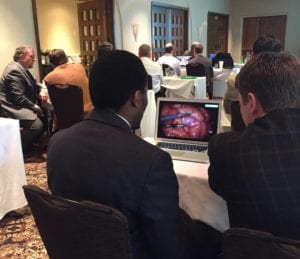Improving Surgical Skill Through Peer-to-Peer Coaching
It was early on a fall Friday morning, and as the sun twinkled through the brightly colored trees of the golf resort, the surgeons gathered their bags and went to the meeting room. They were not golfing that day. The bags contained laptops and notepads, not golf clubs.
This group of about 30 surgeons were gathering for a coaching session to improve their surgical technique. Here, they sat in pairs with a laptop between each set of doctors, and reviewed video footage of past surgical procedures. One surgeon in each pair was the coachee, whose surgical technique was being reviewed on screen. The other surgeon in each pair was the coach, who provided advice and guidance to finesse the surgery for better results.
These coaching sessions are a side project of the Michigan Bariatric Surgery Collaborative (MBSC), an initiative between Blue Cross Blue Shield of Michigan, the University of Michigan Health System, 38 other hospitals and close to 70 bariatric surgeons statewide. 
Over the last 10 years, the MBSC has collected data on roughly 67,000 Michigan patients who have undergone a bariatric procedure. The Collaborative analyzes the data, and gathers several times a year to discuss findings and best practices for improving the quality and safety of bariatric surgeries. And it’s worked.
“Surgical complications like infections, blood clots and re-admissions have decreased significantly,” says Amir Ghaferi, MD, MS, director of the MBSC and assistant professor of surgery at University of Michigan. “Through this initiative, we’ve shared our findings through 50 published journal articles, and have made close to 100 presentations to medical and surgical groups worldwide. In fact, we have interest from other states that want to join the MBSC.”
As part of the initiative, MBSC leaders conducted a small study to see if there was a connection between a surgeon’s individual technique and the outcome of the surgery. The study results validated the assumption. Indeed, even if a surgeon is performing all the recommended processes, the skill and finesse of that surgeon also contribute to the outcome quality.
“Things like how gently the organ tissue is handled while cutting, or how nimbly the surgical stitching is completed, or even how much the patient’s tissues and organs are moved during the procedure, all contribute to a patient’s post-procedure recovery,” says Dr. Ghaferi.
But these are delicate, insider tricks that only a skilled surgeon can teach another. The surgical coaching program was launched.
“We were awarded a grant from the National Institutes of Health to study the effect of one-on-one surgical coaching,” says Justin Dimick, MD, director of the coaching program and professor of surgery at the University of Michigan. “Now, this is the largest surgical coaching program in the country. And it’s all voluntary – coaches and coachees choose to participate.”
To participate in the coaching program, surgeons leave their egos at the door. They create a trusted atmosphere where ideas are shared and all are willing to receive constructive critique. Even surgeons who may work at competing hospitals put it all aside for the greater good of patient care.
Coach and bariatric surgeon Steve Poplawski, MD, from Forest Health Medical Center in Ypsilanti, joined the program to help others and to learn from others. “We are raising the bar, learning to be more efficient and serve our patients better,” he says. “We are exchanging ideas, harvesting each other’s experience and knowledge. It’s not about what one person thinks is the best way, it’s about sharing knowledge so we all can continuously improve.”
And that means a better experience for the patient.



